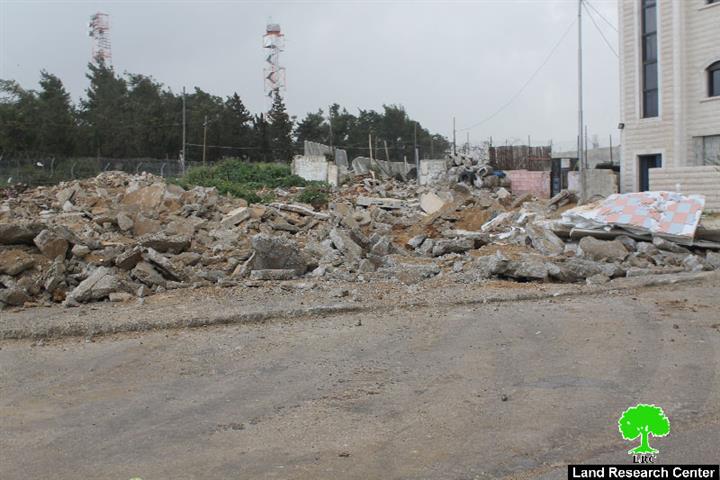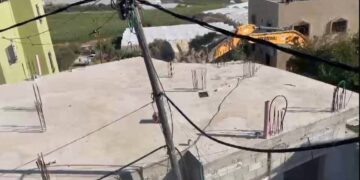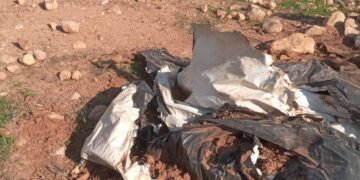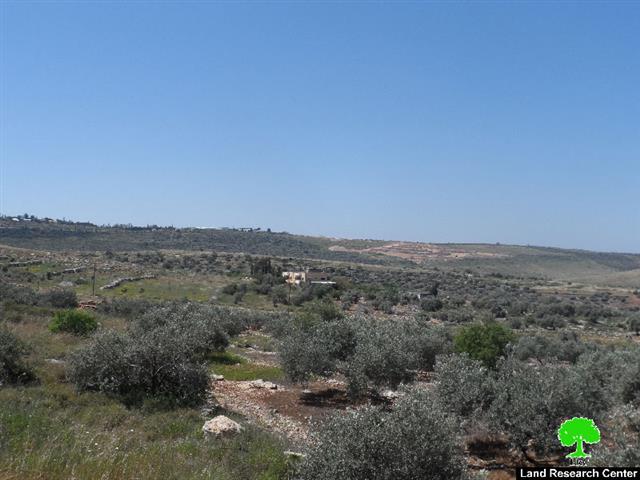Dozers of Israeli Occupation Forces demolished on March 15, 2016 four commercial warehouses and the foundation of a residential building. Not only, the attacking force ravaged a plot of land in the area as well. The attack was reported to be carried out on the claim that structures were "unlicensed" and close to a military camp. Noteworthy, the attack location is close to the apartheid wall that separates Beit Hanina from Al-Ram town. It should be marked that the demolished structures belong to citizen Habib Al-Hroub; a Jerusalemite living in the Old City.
Hroub told Land Research Center the following: " In 2010, I established two warehouses on the plot I own and dug foundation for a new residential building. Shortly after establishing the warehouses, I received a demolition order on the claim of "unlicensed construction" and proximity to military camp that is 100 meters away from the building. I then sought attorney Sami Irsheid to follow up on the case.
On March 15, 2016, I received a phone call from my brother saying that Israeli Occupation Forces and dozers embarked on demolishing my properties. Demolition reached out four warehouses (100m2 each) that are leased for citizen Shadi Mtour, who used the structures to store imported clothes. Also, a playground of 600m2 cultivated with 40 olive and citrus trees was demolished in the operation. Not only, two portable toilets and a 450m2 foundation were brought down. This demolition came without any previous warning or notice despite that our case was followed up on by an attorney. My losses totaled 650,000 INS"
Land Research Center LRC sees that demolitions contradict with and violate all of the International conventions and Humanitarian laws including:
- Article 17 of the (1948) Universal Declaration of Human Rights stating: “Everyone has the right to own property alone as well as in association with others. No one shall be arbitrarily deprived of his property.”
- Section ‹G› of article 23 of the (1907) The Hague Conventions asserting: “In addition to the prohibitions provided by special Conventions, it is especially forbidden to destroy or seize the enemy's property, unless such destruction or seizure be imperatively demanded by the necessities of war.”
- Article 53 of the Geneva Fourth Convention (1948) declaring: “Any destruction by the Occupying Power of real or personal property belonging individually or collectively to private persons, or to the State, or to other public authorities, or to social or cooperative organizations, is prohibited, except where such destruction is rendered absolutely necessary by military operations.”
Section 1, Article 11 of the International Covenant on Economic, Social and Cultural Rights (1966): “The States Parties to the present Covenant recognize the right of everyone to an adequate standard of living for himself and his family, including adequate food, clothing and housing, and to the continuous improvement of living conditions. The States Parties will take appropriate steps to ensure the realization of this right, recognizing to this effect the essential importance of international co-operation based on free consent
Prepared by
The Land Research Center
LRC


















